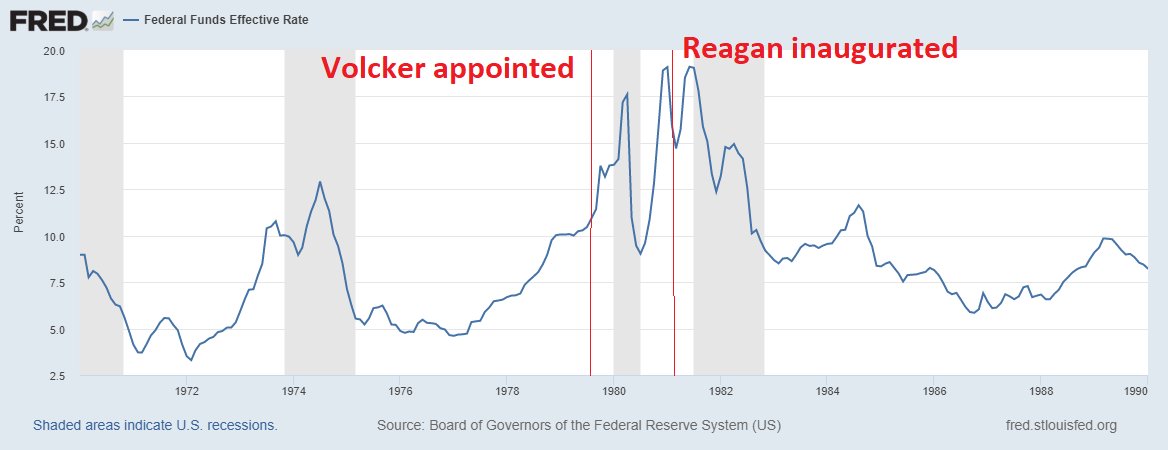
1/Today's Substack post is about Jimmy Carter and Ronald Reagan.
There's a mythology that has grown up around these two Presidents, and I aim to bust the myths.
noahpinion.substack.com/p/much-of-what…
There's a mythology that has grown up around these two Presidents, and I aim to bust the myths.
noahpinion.substack.com/p/much-of-what…
3/First, let's bust the myth that Reagan tamed inflation.
It was Paul Volcker who tamed inflation, by raising interest rates.
And who appointed Volcker? Jimmy Carter.
And under which President did Volcker raise interest rates? Again, Jimmy Carter.
It was Paul Volcker who tamed inflation, by raising interest rates.
And who appointed Volcker? Jimmy Carter.
And under which President did Volcker raise interest rates? Again, Jimmy Carter.

4/And of course, raising interest rates to beat inflation came at a cost -- two recessions.
The first of these was under...Jimmy Carter.
The first of these was under...Jimmy Carter.

5/But did Carter do a whole lot of deficit spending, thus contributing to inflation?
No, he did not.
No, he did not.

6/Carter knew Volcker was an inflation hawk. That's why he appointed him. He knew what the cost of beating inflation would likely be. He appointed Volcker anyway. (Reagan later fired Volcker.)
Carter is the conqueror of inflation.
Carter is the conqueror of inflation.
7/Next, let's bust the myth that Reagan was the Great Deregulator. Sure, Reagan did some deregulating. But Carter did much more than Reagan, even in half the time!
8/Don't believe me? Let the libertarian Foundation for Economic Education and the libertarian magazine Reason make my case for me:
fee.org/articles/jimmy…
reason.com/2010/11/09/3-c…
(He also did some financial deregulation they don't mention)

fee.org/articles/jimmy…
reason.com/2010/11/09/3-c…
(He also did some financial deregulation they don't mention)


9/Carter enlisted the services of a ton of pro-deregulation advisors, including the economist Alfred Kahn, who testified to Congress that “The superiority of open markets…lies in the fact that the optimum outcome cannot be predicted.”
jthtl.org/content/articl…
jthtl.org/content/articl…
10/Carter even proposed a "regulatory budget" for the federal government -- a very radical deregulatory proposal!
scholarlycommons.law.case.edu/cgi/viewconten…
scholarlycommons.law.case.edu/cgi/viewconten…
11/OK, on to the third myth: That Reagan outspent the USSR with a huge defense buildup and drove it into bankruptcy.
Yes, in absolute dollar terms, Reagan did increase military spending substantially...
Yes, in absolute dollar terms, Reagan did increase military spending substantially...
12/BUT, note that Soviet military spending actually rose BEFORE U.S. military spending! And it didn't increase much when Reagan was President.
This suggests the U.S. buildup was a reaction to the Soviets, not a way to get them to spend themselves into bankruptcy!
This suggests the U.S. buildup was a reaction to the Soviets, not a way to get them to spend themselves into bankruptcy!

13/And in fact, the Soviets did NOT spend themselves into bankruptcy. Here's spending as a percent of GDP. You can see that the Soviets came nowhere close to a wartime defense effort (and Reagan's buildup barely registers!). 

14/So why did the USSR collapse in the 80s?
According to Yegor Gaidar, it was a drop in oil prices that dealt the final death blow to their tottering, sclerotic economic system
amazon.com/Collapse-Empir…
According to Yegor Gaidar, it was a drop in oil prices that dealt the final death blow to their tottering, sclerotic economic system
amazon.com/Collapse-Empir…
15/Neither Carter nor Reagan had much to do with the collapse in oil prices (it was due to a bunch of non-OPEC countries developing new oil production).
But note that one thing Carter DID do was to arm the mujahideen in Afghanistan to fight the Soviets!
en.wikipedia.org/wiki/Operation…
But note that one thing Carter DID do was to arm the mujahideen in Afghanistan to fight the Soviets!
en.wikipedia.org/wiki/Operation…
16/So there you have it: Much of what you've heard about Carter and Reagan is a myth.
One lesson here is that people tend to associate economic trends with the President they occurred under, rather than the President who enacted the relevant policies.
One lesson here is that people tend to associate economic trends with the President they occurred under, rather than the President who enacted the relevant policies.
17/Carter conquered inflation but it didn't fall until Reagan was in office. Carter deregulated, but the economy didn't boom til Reagan was in office. Carter armed the mujahideen, but the Soviets withdrew from Afghanistan under Reagan. Etc.
18/This means Carter deserves much more of the credit AND much more of the blame for the 1980s and the whole "neoliberal" era. If the Volcker recessions broke the power of labor, well, that was Carter. If deregulation increased inequality, that was also Carter.
20/I think busting these folk-historical myths can help us understand our current political age.
(end)
noahpinion.substack.com/p/much-of-what…
(end)
noahpinion.substack.com/p/much-of-what…
Oh yeah, and sign up for my Substack's free email list if you haven't already!
noahpinion.substack.com
noahpinion.substack.com
• • •
Missing some Tweet in this thread? You can try to
force a refresh





